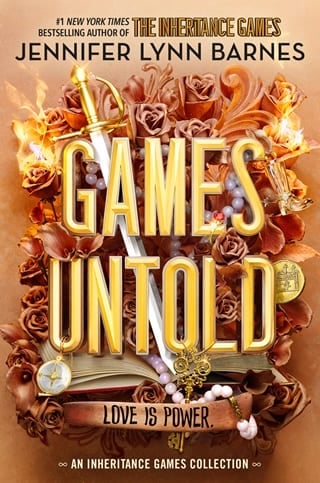Chapter 17
Chapter 17
I managed to hold out for a few days before looking up the words Harry had said. It was a poem—an old one. The poet’s name was William Blake. The poem was about vengeance. I read it from beginning to end probably a dozen times, and true to Harry’s prediction, I understood it.
I felt every single word of it.
The title of the poem was “A Poison Tree.”
After my shift that night, I hit the grocery store. Since I wasn’t planning to buy any medical supplies, I didn’t bother with the two-bus, three-mile-hike routine and just went to the store closest to the hospital instead. It wasn’t until I got in line to check out that I realized I was being watched.
A man stepped into line behind me. He wore jeans that looked too new and a plain T-shirt that fit him like he was more used to wearing suits. I could feel him studying me—not like a book but like something under a microscope.
I wondered if he worked for Tobias Hawthorne, if he was one of the infamous fixers—and if so, why he was still here. Or maybe he was a reporter who’d stuck around after the story had begun to grow cold, hoping for a different angle.
Either way, I refused to let on that I’d noticed him watching me. He waited until the cashier began ringing up my groceries to speak. “I hear you’re a Rooney.”
I bagged my own food, not even looking at him. “You can’t believe everything you hear.”
I didn’t make the hike up to Jackson’s until I was sure that I hadn’t been followed back to my apartment, and when I did go—checking over my shoulder every ten steps across the rocks—I didn’t say a word about the man at the store. I just wordlessly started unpacking the groceries.
“Where are my lemons?” Harry spoke from the mattress.
Jackson slid in beside me. “Where’s the bourbon?” he asked, his voice low.
I gave a slight shake of my head. I hadn’t bought bourbon.
“The pain, Hannah.” Jackson was a no-frills kind of person at the best of times. This wasn’t the best of times, and there wasn’t an ounce of sugarcoating in his tone. “It’s getting worse. A whole hell of a lot worse.”
“It shouldn’t be,” I said quietly. Should it? I approached the patient, an uncharacteristic hesitation in my step.
“Don’t touch me.” For once, there was nothing smooth in Harry’s tone, nothing dark or knowing.
I wished I’d bought the damn bourbon.
I laid the back of my hand against first his cheek, then his forehead. Hot to the touch. “I have no desire whatsoever to touch you,” I murmured—but I did, again and again, checking his injuries.
At a certain point, it became clear to me that no touch was gentle enough.
There’s something wrong. I’d examined everything but the burns on his chest. As I braced myself to do what had to be done, my gaze caught on an object sitting beside him on the mattress: a tiny, intricate paper cube. Thirty folds, at least.
“You folded this.” I didn’t phrase it as a question.
“Won the paper off Jackson,” Harry said. He was looking at me now, and his eyes were a little glassy.
I touched his face again, confirming what I’d felt before. Fever.
“The question, Hannah the Same Backward as Forward,” he said, his voice closer to a whisper than a rasp, “is whether you can unfold it without tearing the page.”
I didn’t touch the paper cube until he fell into a fitful sleep. By that point, I’d already looked at his chest.
It didn’t look good.
 Fullepub
Fullepub 



